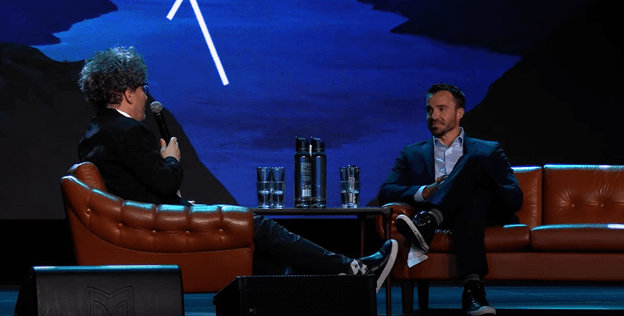How to Survive a Cult
Chess saved his life… but first, it ruined it.
That’s what Danny Rensch told me on stage at the Norway Summit last month.

And I don’t mean metaphorically. I don’t mean “chess saved me” like a high school teacher saying, “Football kept me off the streets.”
I mean: He was literally taken from his family by a cult leader obsessed with chess.
Yeah. Let’s rewind.
The Game That Took (and Gave) Everything
Danny was 9 years old when he first touched a chessboard. He was living in what he now openly calls a cult—a “spiritual collective,” as they phrased it then.
The cult leader was obsessed with chess. Not just “I enjoy the occasional match” obsessed. More like “this child is my pawn in a divine game” obsessed.
So when Danny showed talent—real talent—the kind that doesn’t just beat other kids at school, but travels the world and wins tournaments—they moved him out.
At 12 years old, they took him from his mother and placed him in an apartment alone, so he could train full-time and travel for chess.
He didn’t speak to his mom for ten years. She lived 500 feet away.
And the craziest part? No one stopped it. No one said, “Hey, maybe don’t remove a child from his family so he can become the Bobby Fischer of the Bible Belt.”
But that’s what happened.
He became one of the top American youth players. Traveled the world. Slept in strangers’ homes. And for a while, he bought into it. He thought he was special.
Destined. Chosen.
Which, to be fair, is the kind of thing you believe when a grown man tells you your purpose is ordained by God and your only job is to sacrifice everything for the game.
But chess wasn’t just a game. It was his prison. And his escape route.
Because while the cult manipulated him, controlled him, used his gift, they also gave him the one thing they didn’t expect: perspective.
“Chess was my tormentor,” he told me, “but also my mentor.”
Dark Squares, Bright Future
Eventually, his body forced him to stop. He got sick. Lost his hearing. Literally bedridden for two years. His dreams of becoming a grandmaster? Done.
But this is where the story flips.
Because sometimes when you lose the thing that defined you, you finally figure out who you really are.
While recovering, Danny discovered the internet. YouTube. Forums. He realized chess didn’t have to be a solitary, brutal obsession. It could be something more. Something joyful.
Something… social.
And that’s when he helped launch chess.com.
Today? 200 million users. 10 million active players a day. Global tournaments. Twitch streams. Memes. Drama. Magnus.
Chess isn’t just a game anymore. It’s a culture. A movement. A business.
And Danny Rensch—the boy who was taken for his talent—is now a chief architect.
What I Learned
We talked about chess. About cults. About trauma, therapy, lawsuits, scandal, and Elon Musk's brain chip. (Yes, really.) But here’s what stayed with me:
- You can build something beautiful from something broken. Pain is not destiny. It’s just input.
- Your origin story doesn’t get the last word. You can write your own next chapter—even if you’ve been told otherwise.
- The same thing that crushes you can be the thing that saves you. That’s not paradox. That’s life.
And maybe most of all…
- There’s always a best move on the board. You just can’t always see it. Which means: don’t panic. Don’t rush. Don’t resign too early.
Danny has a book coming out soon.
It’s called Dark Squares. I got a preview. It’s raw. Honest. Wounds wide open. It’s not a chess book. It’s a book about being human.
You should read it.
And maybe, when you’re facing something impossible, you’ll remember this:
No matter what happened…
You’re still in the game.
And the next move is yours.










